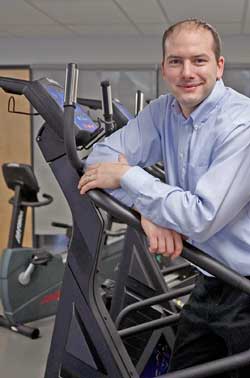Exercise science stretches in a whole new direction

Simon Bacon did his PhD in his native England.
Photo by andrew dobrowolskyj
The recent addition of Assistant Professor Simon L. Bacon to the Department of Exercise Science brings a new dimension to this dynamic department’s research activities.
Bacon is interested in the roles of exercise and stress management in the treatment of chronic diseases, especially heart disease and asthma. With cross-appointments as an associate researcher at the Montreal Heart Institute and Hôpital Sacré-Coeur, he will continue to pursue these lines of investigation, and he will begin new research at Concordia.
Born and brought up in England, Bacon has always been interested in exercise and, as a graduate student, began to think about how the mind can alter the physiology of the body. While working on his PhD at the School of Sport and Exercise Sciences at Birmingham University, he studied physiological responses to physical and psychological stress in patients with coronary artery disease.
As the study subjects did some cycling and arithmetic problems, the researchers examined cardiovascular and blood-based markers, such as blood pressure, to see how they changed.
“There was some preliminary evidence to suggest mechanisms by which stressful tasks may lead to events like heart attacks,” he said.
After obtaining his PhD in 2001, he went to Duke University in North Carolina to do three years of postdoctoral work. There he was involved in a study published last spring in the Journal of the American Medical Association that looked at the effects of exercise and stress management training on cardiovascular risk in patients with ischemic heart disease. Ischemia is characterized by reduced blood to the heart and sometimes chest tightness.
Many patients undergo both stress management and exercise programs after they develop ischemia, but Bacon explains there were no good studies comparing the effectiveness of these therapies.
This project found that cognitive behavior therapy (an intervention that helps people deal better with the stresses in their lives) was slightly more effective in reducing ischemia than exercise, and both interventions were better than nothing.
Bacon’s wife is a Montrealer, and he admits it didn’t take much convincing for the couple to move here after his finished his work at Duke. He did another year of postdoctoral work, this time with the Department of Psychology at McGill University and the Nuclear Medicine Department at the Montreal Heart Institute, looking at patients who suffer what is called silent ischemia, or reduced blood to the heart without associated pain.
The study, scheduled for publication this month, looked at the relationship between high blood pressure and decreased sensitivity to pain during exercise.
Bacon came to Concordia last summer and is currently teaching two undergraduate courses. “I also have ongoing research with the Heart Institute that I started during my year at McGill,” he said, looking at the role of the endothelium (the inner lining of the blood vessels) in ischemia, pain, and blood pressure. If it turns out that endothelial dysfunction plays a role, this can be treated with medication, diet and exercise.
“We may be able to improve people’s pain sensitivity, which, in the context of heart disease, is a good thing because they will feel what is happening to them,” he said. He is also starting a new project looking at how endothelial function may predict cardiovascular events in women. This research recently brought him an award from the Canadian Hypertension Society.
Bacon’s other line of research involves the role of stress management in helping people achieve better control of their asthma. So far, his research suggests that increased stress is associated with poor asthma control.
In Canada, he notes, over 50 per cent of people who have asthma, regardless of its severity, control their asthma poorly: they have more events and are more bothered by them.
“We are further advanced in understanding stress management in cardiology, but we have a long way to go with asthma,” he said. He is just beginning another study to examine the effects of brief exercise on asthma control.
Bacon’s new Behavioural Medicine Laboratory at Concordia is not yet up and running, but when it is, he expects to start another line of research involving a younger population before heart disease starts to affect them, and to look at the effects of stress and behavioural interventions in the prevention of cardiovascular disease.
“The ultimate goal is to get people early, before they have had a first heart attack,” he said.